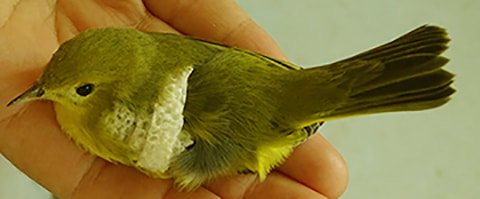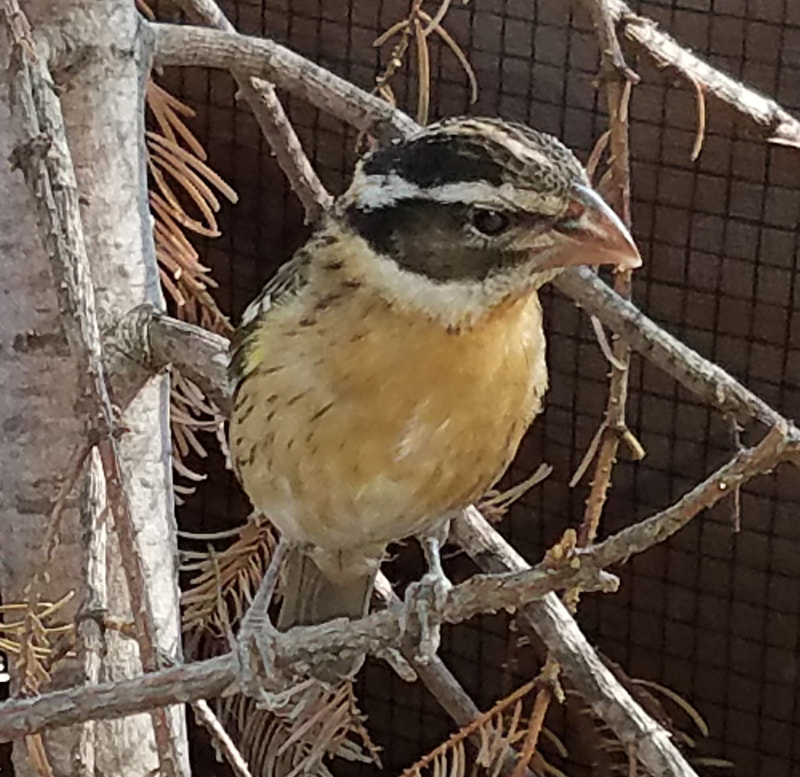|
Summer is nearly over and we are nearing 200 bird calls since January. This is 4 times what we have done in the past. We have had a wide variety of very neat birds this summer. From common poorwills to golden-crowned kinglets, to a pied-billed grebe to a magpie. Mourning doves were plentiful, with babies coming in mainly from being found in situations where they were at risk from outside cats. We usually advise people to leave healthy fledglings (simply not enough help, money, or time to care for ALL at risk babies, we'd be swamped!). But, quite often its impossible to tell if the bird is in need or injured or healthy. Robins, doves, and flickers are most at risk because they must spend a couple weeks on the ground learning to eat when their flight ability is non existent or not great yet. These babes often come in cat attacked, or from hitting windows. We love all our babies here, and the injured ones too. We do our best for all of them. So, What do we do for the birds?(And why donations matter!) From babies to adults with injuries, Native Bird Care provides care. Often, this includes medical care - treating wounds, infections, broken bones, parasite infections, concussions, etc. Wildlife rehabbers are essentially nurses, paramedics, physical therapists, husbandry specialists, and mothers - all at the same time. Babies get raised with food and habitats that they need for good development - specialty housing, diets, flight cages. Injured birds need medical care, which if we cannot do it ourselves, we enlist a veterinarian. Birds with breaks must be treated and the injuries set and wrapped. Birds who have been mauled by a cat need to have wounds washed out, stitched, and go on antibiotics. Birds in poor condition usually need treatments for parasites. Native Bird Care also consults with rescuers over the phone, determining if a bird needs care or consulting on how to renest or reunite with a parent. We provide advice on protecting birds from windows and cats. And, we spend much time out relocating geese off buildings, capturing the injured, and putting ad-hoc nests up for families who have lost theirs to wind or raids. Its a long to-do list! And all of it is expensive. The cost for caring for one bird runs from $50 to far more in a case like Hope the swan. This is medication, food, supplies, nutritional supplements, live food for insect only eaters, veterinary care (xrays), and aviary costs. We are very efficient and frugal here at Native Bird Care. We run a tight ship, and use our donations wisely and only for animal care. No one gets paid a wage, all work is done by our lead rehabilitator and volunteers. Each bird gets dedicated time, attention, and care. And all are cared for as if their lives depended on it, because they do! Please help support our birds and the work we do. Donations are all tax deductible.
SAll babies are adorable, sweet, and fun to raise. But there are some that just steal your heart. Piper is one. This beautiful bird came in as a tiny nestling, blown out of a very high nest in a pine. After trying to renest and locate parents, Piper came in to care. These sweet birds take longer to rehab than other babies because of those heavy bills, which take time to get hard enough to crack the seeds and cones they will be eating. Our babies often get put in the outside aviaries before they are done hand-feeding. This gives them a head start getting their flight skills and developing their ability to navigate trees and branches. All young birds need time in an aviary to develop their physical abilities before going out in the wild. A"hard release" is when a juvenile bird is release straight from an inside enclosure to the wild. This is extraordinarily hard for young birds. Just like any athlete - and that's what birds are, aerial acrobats - young birds need time to develop leg, body, and wing strength. They need time to acclimate to the weather, and sounds of the wild. They need to develop agility - yes, birds can injure themselves specially when young, landing wrong, hitting branches, hitting windows. So, Piper, along with all our other babies get time in one of our 4 aviaries. Good luck Piper, may you have a long, happy life free from cat attacks and unprotected windows. Several of these came in this summer, some babies, some adults from cat attacks or windows. We had another baby one come in right after this one, Dena is still in care. Little runt one, has a good ways to go and the smoke is not helping!
|
AboutNative Bird Care's is celebrating its 10th anniversary! Our main focus is song, shore, and waterbirds. We offer specialized care and facilities for these extraordinary birds.. Archives
July 2024
Categories
|

















 RSS Feed
RSS Feed